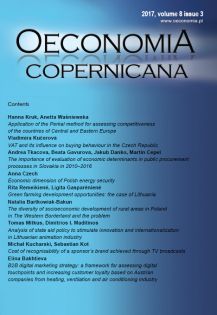The importance of evaluation of economic determinants in public procurement processes in Slovakia in 2010-2016
The importance of evaluation of economic determinants in public procurement processes in Slovakia in 2010-2016
Author(s): Andrea Tkáčová, Beata Gavurova, Jakub Danko, Martin ČepelSubject(s): Economic policy, Government/Political systems, Public Finances, Socio-Economic Research
Published by: Instytut Badań Gospodarczych
Keywords: public procurement; savings of public funds; second order polynomial regression; number of bids; subcontractor;
Summary/Abstract: Research background: Public procurement is designed to efficiently spend public sector financial resources. This should lead to savings in public funds. Domestic and foreign studies point to the fact that sufficient competition on the supply side is the condition for achieving those savings. Slovakia currently belongs to a group of countries with low competition on the supply side of the tender. Every year, about 10,000 tenders will be made in Slovakia for 5 billion Eur. However, contracting authorities have difficulty with establishing the estimated contract value and defining non-discriminatory criteria. On the other hand, contractors lack the expertise to prepare tenders, specifications are often tailored to specific bidders or products, and the price criterion has a negative impact on the quality of the goods and services purchased. Purpose of the article: The aim of the study was to investigate the impact of selected efficiency determinants on savings in public procurement in Slovakia in 2010–2016. The number of bids, the subcontractor's participation, the narrower competition and the impact of the narrower competition and the expected price on the number of bids have been examined.Methods: The survey sample consisted of 800 randomly selected public procurement con-tracts from different sectors in 2010–2016. The contracts were split on the basis of the median estimate of the above-limit (409 contracts) and below-limit (391 contracts) contracts; the divestment value was the estimated price of 400,000 Euro (without the tax).Findings & Value added: The number of offers positively influences the creation of savings in public procurement, an average of 5-6%. The impact of a narrow competition was significant, which led to a decrease in savings of 3-4% compared to the open competition if the sample was 800 contracts and over 400,000 Euro (without the tax). For below-limit orders, this determinant was shown to be statistically insignificant. The size of the contract did not affect the number of successful candidates. Also, the negative impact of narrower competition on the number of tenders was demonstrated. These findings are in line with the presented research studies. In the future, we plan to perform sectoral analyses to verify the validity of the hypotheses under review based on the results of our research.
Journal: Oeconomia Copernicana
- Issue Year: 8/2017
- Issue No: 3
- Page Range: 367-382
- Page Count: 16
- Language: English

